- Clone
- H1.2F3 (See other available formats)
- Regulatory Status
- RUO
- Other Names
- Very Early Activation Antigen (VEA), AIM, EA1, MLR3, gp34/28
- Isotype
- Armenian Hamster IgG
- Ave. Rating
- Submit a Review
- Product Citations
- publications
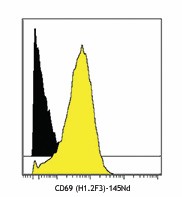
-

C57BL/6 mouse splenocytes were incubated for 18 hours in media alone (black) or with PMA and Ionomycin (yellow). Cells were then fixed, permeabilized, and stained with 145Nd-anti-CD69 (H1.2F3). Data provided by DVS Sciences.
| Cat # | Size | Price | Quantity Check Availability | Save | ||
|---|---|---|---|---|---|---|
| 104533 | 100 µg | £81 | ||||
CD69 is a 60 kD type II membrane protein composed of a 27/33 kD disulfide-linked homodimer, also known as Very Early Activation Antigen (VEA), AIM, EA1, MLR3, and gp34/28. It is expressed on a subset of thymocytes and platelets. CD69 is rapidly induced on activated T and B cells, neutrophils, and NK cells. It is a C-type lectin, closely related to the NKR-P1 and Ly-49 NK cell activation molecules. CD69 is involved in the early events of cell activation and thymocyte positive selection.
Product DetailsProduct Details
- Verified Reactivity
- Mouse
- Antibody Type
- Monoclonal
- Host Species
- Armenian Hamster
- Immunogen
- Mouse dendritic epidermal T cell line Y245
- Formulation
- Phosphate-buffered solution, pH 7.2, containing 0.09% sodium azide and EDTA.
- Preparation
- The antibody was purified by affinity chromatography.
- Concentration
- 1.0 mg/ml
- Storage & Handling
- The antibody solution should be stored undiluted between 2°C and 8°C.
- Application
-
FC - Quality tested
CyTOF® - Verified - Recommended Usage
-
This product is suitable for use with the Maxpar® Metal Labeling Kits. For metal labeling using Maxpar® Ready antibodies, proceed directly to the step to Partially Reduce the Antibody by adding 100 µl of Maxpar® Ready antibody to 100 µl of 4 mM TCEP-R in a 50 kDa filter and continue with the protocol. Always refer to the latest version of Maxpar® User Guide when conjugating Maxpar® Ready antibodies.
- Application Notes
-
The H1.2F3 antibody has been reported to augment T cell activation. Additional reported applications (for the relevant formats) include: in vitro T cell and NK cell activation1-3, immunohistochemistry4,5, and immunoprecipitation1.
This antibody has been characterized in the literature as containing a lambda light chain. - Additional Product Notes
-
Maxpar® is a registered trademark of Standard BioTools Inc.
-
Application References
(PubMed link indicates BioLegend citation) -
- Yokoyama WM, et al. 1988. J. Immunol. 141:369. (IP)
- Sobel ES, et al. 1993. J. Immunol. 150:673.
- Karlhofer FM, et al. 1991. J. Immunol. 146:3662.
- Zhou X, et al. 2005. J. Biol. Chem. 280:31240. (IHC)
- Podd BS, et al. 2006. J. Immunol. 176:6532. (IHC)
- Lawson BR, et al. 2007. J. Immunol. 178:5366.
- Lee JW, et al. 2006. Nature Immunol. 8:181.
- Epardaud M, et al. 2008. Cancer Res. 15:2972. PubMed
- Jordan JM, et al. 2008. 76:3717. PubMed
- Kenna TJ, et al. 2008. Blood 111:2091. PubMed
- Ishikawa C, et al. 2013. Biochim Biophys Acta. 167:99. PubMed
- Product Citations
-
- RRID
-
AB_2563760 (BioLegend Cat. No. 104533)
Antigen Details
- Structure
- C-type lectin, 27/33 kD
- Distribution
-
Activated T cells and B cells, NK cells, granulocytes, thymocytes, platelets
- Function
- Lymphocyte activation
- Cell Type
- B cells, Granulocytes, NK cells, Platelets, T cells, Thymocytes, Tregs
- Biology Area
- Costimulatory Molecules, Immunology, Innate Immunity
- Molecular Family
- CD Molecules
- Antigen References
-
1. Barclay AN, et al. 1997. The Leukocyte Antigen FactsBook Academic Press.
2. Testi R, et al. 1994. Immunol. Today 15:479.
3. Moretta A, et al. 1991. J. Exp. Med. 174:1393.
4. Yokoyama WM, et al. 1988. J. Immunol. 141:369. - Gene ID
- 12515 View all products for this Gene ID
- UniProt
- View information about CD69 on UniProt.org
Related FAQs
- Can I obtain CyTOF data related to your Maxpar® Ready antibody clones?
-
We do not test our antibodies by mass cytometry or on a CyTOF machine in-house. The data displayed on our website is provided by Fluidigm®. Please contact Fluidigm® directly for additional data and further details.
- Can I use Maxpar® Ready format clones for flow cytometry staining?
-
We have not tested the Maxpar® Ready antibodies formulated in solution containing EDTA for flow cytometry staining. While it is likely that this will work in majority of the situations, it is best to use the non-EDTA formulated version of the same clone for flow cytometry testing. The presence of EDTA in some situations might negatively affect staining.
- I am having difficulty observing a signal after conjugating a metal tag to your Maxpar® antibody. Please help troubleshoot.
-
We only supply the antibody and not test that in house. Please contact Fluidigm® directly for troubleshooting advice: http://techsupport.fluidigm.com/
- Is there a difference between buffer formulations related to Maxpar® Ready and purified format antibodies?
-
The Maxpar® Ready format antibody clones are formulated in Phosphate-buffered solution, pH 7.2, containing 0.09% sodium azide and EDTA. The regular purified format clones are formulated in solution that does not contain any EDTA. Both formulations are however without any extra carrier proteins.
Other Formats
View All CD69 Reagents Request Custom ConjugationCustomers Also Purchased
Compare Data Across All Formats
This data display is provided for general comparisons between formats.
Your actual data may vary due to variations in samples, target cells, instruments and their settings, staining conditions, and other factors.
If you need assistance with selecting the best format contact our expert technical support team.
-
Biotin anti-mouse CD69
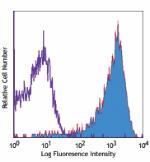
Con A-stimulated Balb/c mouse splenocytes (24 hours) stained... -
FITC anti-mouse CD69
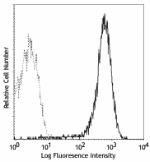
PMA-stimulated (6 hours) splenocytes stained with H1.2F3 FIT... -
PE anti-mouse CD69
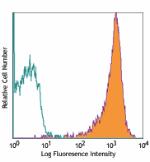
PMA+ionomycin-stimulated C57BL/6 mouse splenocytes (6 hours)... -
PE/Cyanine5 anti-mouse CD69
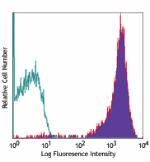
PMA+ionomycin-stimulated C57BL/6 mouse splenocytes (6 hours)... -
Purified anti-mouse CD69
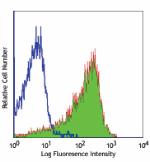
Con A-stimulated Balb/c mouse splenocytes (24 hours) stained... -
PE/Cyanine7 anti-mouse CD69
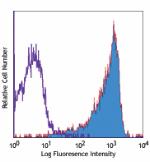
Con A-stimulated Balb/c mouse splenocytes (24 hours) stained... -
APC anti-mouse CD69
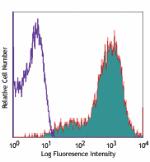
Con A-stimulated C57BL/6 mouse splenocytes (2 days) stained ... -
Alexa Fluor® 488 anti-mouse CD69
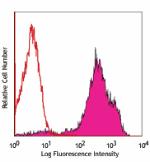
PMA and Ionomycin stimulated C57BL/6 mouse splenocytes (6 hr... -
Alexa Fluor® 647 anti-mouse CD69
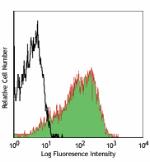
PMA+ionomycin-stimulated (6 hours) C57BL/6 mouse splenocytes... -
PerCP anti-mouse CD69
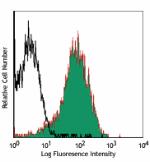
PMA + ionomycin-stimulated (6 hrs) C57BL/6 splenocytes stain... -
PerCP/Cyanine5.5 anti-mouse CD69
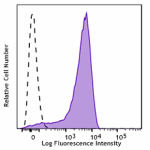
PMA+ionomycin stimulated (6 hours) C57BL/6 mouse splenocytes... -
Pacific Blue™ anti-mouse CD69
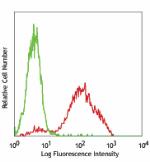
PMA + ionomycin-stimulated (6 hrs) C57BL/6 splenocytes stain... -
Brilliant Violet 421™ anti-mouse CD69
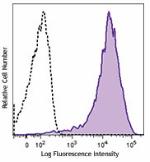
PMA+ionomycin-stimulated (6 hours) C57BL/6 mouse splenocytes... -
APC/Cyanine7 anti-mouse CD69
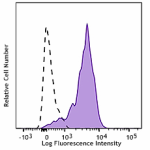
PMA+ionomycin-stimulated (6 hours) C57BL/6 mouse splenocytes... -
Brilliant Violet 605™ anti-mouse CD69
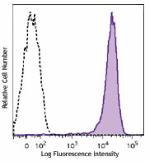
PMA+ionomycin-stimulated (6 hours) C57BL/6 mouse splenocytes... -
Brilliant Violet 510™ anti-mouse CD69
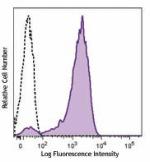
PMA and ionomycin-stimulated C57BL/6 mouse splenocytes (6 ho... -
Purified anti-mouse CD69 (Maxpar® Ready)
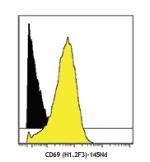
C57BL/6 mouse splenocytes were incubated for 18 hours in med... -
PE/Dazzle™ 594 anti-mouse CD69
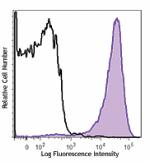
PMA+ionomycin-stimulated (six hours) C57BL/6 mouse splenocyt... -
Brilliant Violet 711™ anti-mouse CD69
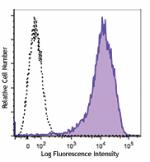
PMA and ionomycin-stimulated C57BL/6 mouse splenocytes (six ... -
Alexa Fluor® 700 anti-mouse CD69
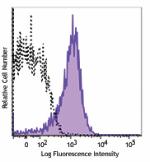
PMA and ionomycin-stimulated C57BL/6 mouse splenocytes (six ... -
Brilliant Violet 650™ anti-mouse CD69
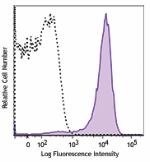
PMA+ionomycin-stimulated (six hours) C57BL/6 mouse splenocyt... -
Brilliant Violet 785™ anti-mouse CD69
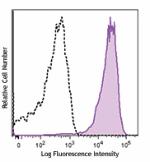
PMA + ionomycin-stimulated (six hours) C57BL/6 mouse splenoc... -
TotalSeq™-A0197 anti-mouse CD69
-
APC/Fire™ 750 anti-mouse CD69
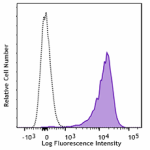
PMA+ionomycin-stimulated (4 hours) C57BL/6 mouse splenocytes... -
TotalSeq™-C0197 anti-mouse CD69
-
TotalSeq™-B0197 anti-mouse CD69
-
KIRAVIA Blue 520™ anti-mouse CD69
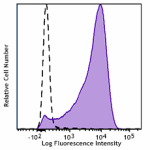
PMA and Ionomycin stimulated C57BL/6 mouse splenocytes (6 hr... -
Spark NIR™ 685 anti-mouse CD69
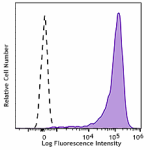
PMA and ionomycin stimulated C57BL/6 mouse splenocytes (six ... -
Spark Red™ 718 anti-mouse CD69
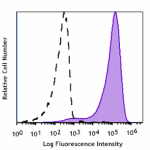
PMA+ ionomycin-stimulated (6 hrs) C57BL/6 splenocytes were s... -
Spark Blue™ 574 anti-mouse CD69 (Flexi-Fluor™)
-
Spark PLUS B550™ anti-mouse CD69

PMA+ionomycin-stimulated C57BL/6 mouse splenocytes (6 hours)...

 Login / Register
Login / Register 










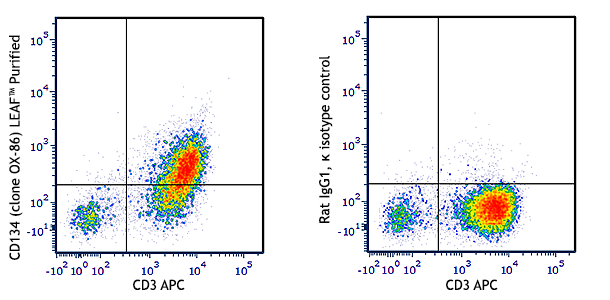
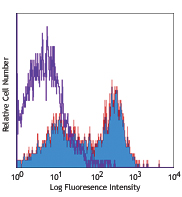
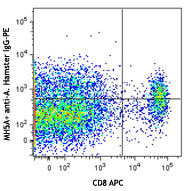
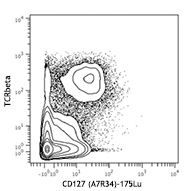



Follow Us